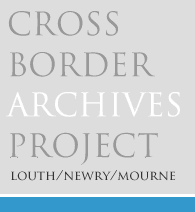Landowners of County Louth
Louth
The Plunkett family of Tallanstown, county Louth was descended from Sir Hugh de Plunkett, an Anglo-Norman who came to Ireland during the reign of Henry II. A branch of the family was associated with Tallanstown by the late 15th century. Oliver Plunkett was created Baron Louth by Henry VIII in 1541. By this time the Plunketts owned a tower house at Tallanstown, later called Louth Hall. It was there that the Lords Louth were to live for the next four hundred years.
During the Elizabethan conquest the Plunketts of Tallanstown remained loyal to the English Crown. But they also formed connections with the old Gaelic culture. They adhered to the Catholic faith through the 16th and 17th centuries. In 1670 Lord Louth supported Oliver Plunkett, the Catholic Archbishop of Armagh and primate of Ireland, providing lodgings for him on his return to Ireland from Rome in 1670. Plunkett was later tried and executed in London for high treason in 1681.
Though the Plunketts were deeply involved in the uphevals of the 1640s and 1689-91, they survived with their lands intact. Lord Louth, a royalist supporter, was taken prisoner in 1642 and was outlawed for high treason, later forfeiting his lands under the Cromwellian land settlement. When Charles II returned to the throne in 1660, most of these lands were restored to Lord Louth and to his son, Matthew.
The accession of James II gave new life to Catholic aspirations. Matthew, the 7th Baron Louth, joined the Jacobite cause in 1689 and commanded an infantry regiment at the seige of Derry. He was outlawed and exiled, and died in September 1689. The 8th Baron Louth, Oliver, was only 21 when he succeeded to the title in 1689. He joined the Jacobite forces and was outlawed, and was in Limerick at the surrender in 1691. He was pardoned under the Arcticles of Limerick. He was made secure in his estates and eventually managed to prove the reversal of his grandfather's outlawry for rebellion in 1641. In October 1695 Lord Louth took the oath of fidelity, but his refusal to take both the oath of royal supremacy over the church and a declaration against Catholic religious practices and beliefs, prevented him from sitting in the House of Lords.
During the period of the Penal Laws, life was made hard for landowning Catholics. Matthew, the 9th Baron Louth (1698-1754), was a minor when his father Oliver died in November 1707. He was placed under the guardianship of Matthew Aylmer, a first cousin of his grandfather, and a convert to Protestantism. Matthew was brought up and remained a Protestant and his descendants were members of the Church of Ireland for many generations. But in the 19th century the family returned to the Catholic faith and Randal Percy Otway, the 13th Baron, was received into the Catholic Church in December 1867.
After their involvement in the wars of the 17th century, none of the Plunketts of Tallanstown were prominent in national affairs. They took part in political and public life only on the local, county level. The family's military tradition persisted into the 19th and 20th centuries. The 13th Baron, Randal Percy Otway Plunkett (1832-1883), was an officer in the 79th Highlanders in the 1850s. The 14th Baron, Randal Pilgrim Ralph Plunkett (1868-1941), was an officer in the Westminster Dragoons and the Wiltshire Regiment, and served in both the First and Second World Wars. The 14th Baron sold most of the estate soon after the 1903 Wyndham Land Act. He died in 1941, and his only surviving son, Otway, was briefly 15th Baron Louth before his death in 1950. The house and demesne at Tallanstown were also sold, some years after the estate, and the family settled in Jersey. Louth Hall is now derelict.
A survey from the 1830s shows that the greater part of the estate, amounting to 3,068 english statute acres, lay in the adjoining parishes of Charlestown, Clonkeehan, Louth and Tallanstown. Also in county Louth there were 218 acres in Oberstown (part of Shanlis) and a house in Carlingford. Outside the county Lord Louth owned 161 acres in Archerstown in the parish of Donaghmore and barony of Rathoath in county Meath, and 371 acres in Lacklum and Lannatt, both in the parishes of Inniskeen, in the barony of Farney, county Monaghan. In 1876, the estate consisted of 3,578 acres in county Louth, valued at £3983 5s, and 178 acres in Monaghan valued at £131 10s, while Lady Louth owned the 161 acres in Meath, valued at £150 10s. Besides these lands, at various times the Plunketts owned land in counties Kildare and Galway, and in Somerset, England.
Sources
The estate papers of the Lords Louth are held by the National Library of Ireland, view pdf of collection list here. For contact details of the National Library of Ireland, see www.nli.ie.
Louth County Archives Service holds the Louth estate maps of 1833, and Lord Louth's personal diary for the year 1900.
Extract from the diary of Lord Louth, 1900
- home |
- about project |
- online catalogue |
- online exhibitions |
- activities |
- oral history collection
- about us |
- contact us |
- legal |
- acknowledgements
© Cross Border Archives Project . Website design and development by morsolutions.
This project is part financed by the European Union through the Interreg IIIA Programme managed for the Special EU Programmes Body by the East Border Region Interreg IIIA Partnership.




